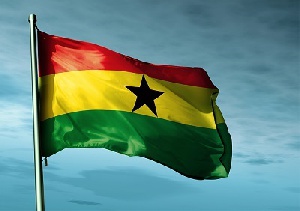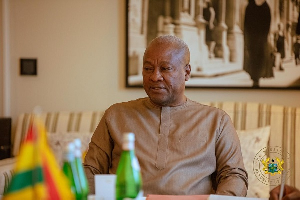By Elsie Heto-Tetteh
Mr. President, as a concerned citizen of Ghana and the leader of Women for Peace in Ghana, I would like to share with you my deepest conviction that most of Ghana’s challenges today can be resolved if we the citizens of the country change our mindset and draw on our inner energy to activate our potentials.
I believe we need a leadership that can guide us to come to a clear understanding of the root cause of our sufferings and be able to harness the potential that each one of us has to change our circumstances.
It is true that Ghana has had her share of leadership failures, policy mistakes and varieties of inefficiencies in the past. We have also blamed the outside world for many of our predicaments in the past. Much of these seem to have changed under your leadership. We need to build further on the changes that we have so far experienced under your leadership in order to enjoy sustainable peace and progress.
We the members of Women for Peace are convinced that we need to place the human factor at the centre of our thinking and solutions to the problems we continue to face in the country. This has motivated me to write this open letter to you.
The main source of our conviction is the teachings of the Buddha. Buddhism has long been celebrated as a religion of peace and non-violence. It teaches that we all live our lives in accord with the laws of the universe which operate eternally and are reflected in our inner lives. That is, everything around us alters according to our inner state of life. Thus, if we change ourselves, our circumstances will inevitably change. The spiritual and the physical are inseperable. This holds true in every country and society.
Thus, the Buddha (i.e. the awakened person) reminds us that “there are not two lands, pure and impure in themselves. The difference lies solely in the good or evil of our minds. If the minds of the people are impure, their land is also impure, but if their minds are pure, so is their land”.
Buddhism therefore shifts the burden of prosperity and peace from the government to the individuals and communities. But governments must provide the enabling environment within which individuals can nurture their inner life conditions. Those who understand this basic principle are able to provide their countries good leadership and will enjoy the support of their citizens.
Buddhism also teaches that each individual’s journey through life is laced with challenges from birth to death. During this span of life, the cumulative experiences (i.e. ways in which individuals tackle the complex set of events in their lives) provide the foundations of their basic life tendencies. Buddhism classifies the fundamental life tendencies of human beings into ten hierarchically ordered categories: These are Hell, Hunger, Animality, Anger, Tranquility, Rapture, Learning, Realization, Altruism and Wisdom/Compassion (also known as Buddahood).
The first six states are called the six lower life conditions. They have in common the fact that their emergence or disappearance is governed by external circumstances. Many of us – individually as well as nations – spend time shuttling back and forth among the six lower life conditions without ever realizing that we are being controlled by our reactions to the environment.
That is, we are ignorant to the fact that it is in our power to change from negative tendencies to positive ones. Buddhism refers to this ignorance as "fundamental darkness" because it clouds and obscures the light by which we might see things in their true nature.
The next two states – learning and realization – come about when we recognize that everything experienced in the six lower life conditions is impermanent. This awareness enables us to begin to seek some enduring or higher level vision that can drive our lives and ensure our development.
These two states plus the next two – altruism and compassion/wisdom – are called higher life tendencies. Unlike the six lower tendencies (which are passive reactions to the environment) these four higher tendencies are achieved through deliberate effort. The wisdom that illuminates and makes these higher life tendencies manifest in our lives is referred to as "enlightenment".
Mr. President, my vision is that our national leaders will encourage an awareness of these life tendencies and motivate individuals to move themselves from the lower to the higher life conditions. We all have the capacity to transform this “fundamental darkness” of ignorance into an illuminating "flame" of enlightened wisdom. This will enable us to individually and collectively contribute to nation building. It also means that we must be bold enough to speak against mindsets that nurture in people a sense of resignation and a feeling of powerlessness to transform their own circumstances.
We too often hear of religious leaders who, instead of helping people alleviate their sufferings, rather exploit them for their financial gains and plunge them into more sufferings. This must stop. Buddhists believe that the 21st century marks the age of soft power and inner motivated philosophy. People, who give their allegiance to something outside their lives and look for joy from external factors, cannot eradicate evil and secure peace in this country.
This process of transformation is termed human revolution - i.e. the gradual positive transformation of our inner life that eventually finds expression in our environment. Daisaku Ikeda, the president of Soka Gakkai International (SGI - a global Buddhist organization) observes that “great human revolution in the life of a single individual can cause a change in the entire world". The Buddha therefore encourages every person to chant NAM - MYOHO - RENGE –KYO to be awakened to the true nature of the cosmos and tap the essence of his/her inner life and thereby begin the process of human revolution.
It is also important to note that from the Buddhist perspective, to achieve peace we need to resolve the underlying causes and conditions of suffering.
Nichiren Daishonin, based on his profound empathy for the people sought to understand the underlying cause of suffering and the cause of natural disasters and after searching through the scriptures became deeply convinced that slander of the mystic law ;- following and supporting teachings that reject or negate respect for the dignity of life as taught in the Lotus sutra , was the source of profound suffering and misery in society .
Teachings that nurture in people a sense of resignation and powerlessness to transform their own circumstances. Teachings of which people proclaim themselves as "men of God" and prophecise people's faith and deliver them of the devil is an illusion.
Human nature is both positive and negative and no human being has the power to transform another's fundamental nature. These are all erroneous views of what truly the true nature of life is.
In one of his writings "On Attaining buddhahood in this life time" Nichiren Daishonin said,
"If you think the Law is outside yourself, you are embracing not the Mystic Law of life but an inferior teaching. “Inferior teaching” means those other than this [Lotus] sutra, which are all expedient and provisional. No expedient or provisional teaching leads directly to enlightenment .
In addition, economic hardships tend to create suffering for most of us in Ghana. Thus, contrary to what some people may think, Buddhism does not reject economic prosperity. The good news is that Buddhism gives us the key to elevate our life conditions – i.e. from lower to higher life tendencies – and thereby create economic fortune through our active participation in the economy. This is the benefit of applying the strategy of the Lotus Sutra.
Mr. President, as we get ready to elect our next government, I hope you will reflect on these ideas and provide us with the leadership that will replace our sufferings with hope, peace and prosperity. Ghanaians need to free themselves from the deluded mindset of seeking prosperity without nurturing their inner life conditions. Let us all wake up!!
Lastly Mr. President, l would like to urge you all presidential and parliamentary candidates as well as all citizens of Ghana to recite the wonderful Law of NAM- MYOHO - RENGE - KYO for the Peace and security of the nation.
Thank you for your attention. With my deep respect.
Director of Women for Peace in Ghana Contact: elsieheto85@gmail.com
Opinions of Monday, 21 November 2016
Columnist: Elsie Heto-Tetteh



















